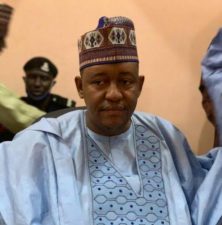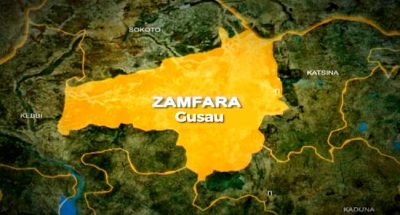The presidential election petition tribunal sitting at the Court of Appeal, Abuja, has granted the request by the Peoples Democratic Party (PDP) presidential candidate, Atiku Abubakar, and his Labour Party counterpart, Peter Obi, to inspect the election materials used during last Saturday’s presidential poll.
Shortly after the results were announced, Atiku and Obi refused to concede defeat in the February 25 presidential election, vowing to recover their mandate in court.
The two candidates rebuffed the gesture of reconciliation made by the President-elect, Bola Tinubu, who in his acceptance speech after he was declared the winner of the poll on Wednesday, asked them to support him in the task of building the nation.
Atiku and Obi spoke at separate news conferences in Abuja on Thursday.
Making real their vow, they approached the tribunal yesterday seeking permission for the inspection of election materials used during last Saturday’s poll.
But the court on Friday granted both candidates’ request to have access to all the sensitive materials INEC deployed for the presidential election won by All Progressives Congress presidential candidate, Bola Tinubu.
The Justice Joseph Ikyegh-led panel of the appellate court, which will also sit as the presidential election petition tribunal, granted the request after hearing two separate ex-parte applications brought by Atiku, Obi and their political parties.
The electoral umpire, Tinubu and APC were cited as Respondents in the matter.
Both applications were predicated on Section146 (1) of the Electoral Act 2022, Paragraph 47 (1, 2 &3) of the First Schedule of the Electoral Act of 2022, as well as under the inherent jurisdiction of the court as referenced by Section 6 (6) A & B of the 1999 Constitution, as amended.
Obi, in his application that was moved by his team of lawyers led by Alex Ejesieme (SAN) sought six principal reliefs.
Atiku’s lawyer, Adedamola Faloku, sought seven prayers from the tribunal.
Specifically, the applicants urged the court to compel INEC to allow them to obtain documents in its custody that were used for the presidential election.
They maintained that the requested documents would aid their petition against the outcome of the presidential contest that was declared in favour of Tinubu.
Electoral Act Didn’t Mandate INEC To Transmit Results Electronically – Tinubu
But the president-elect, Tinubu, described Atiku and Obi, as bad losers, saying they can go ahead and challenge the election with their ridiculous claims.
The former Lagos governor argued that the Electoral Act 2022 (as amended) did not mandate the Independent National Electoral Commission (INEC) to transmit election results electronically.
Speaking through the special adviser on Media and Publicity of the APC presidential campaign council, Dele Alake, the president elect said claims that the bimodal voter verification system (BVAS) was not used during the election is false because Atiku and Obi were accredited by the device.
He said, “Let us say, unequivocally, that we welcome the decision of both the PDP and LP and also the NNPP candidates to test their claims, as ridiculous as they are, in the court of law as provided for by our constitution.
“This is without prejudice to the conciliatory efforts of the President-elect, Asiwaju Bola Ahmed Tinubu. He has reiterated in his post-declaration speeches the need for all Nigerians, irrespective of whom we all voted for, to rally quickly together for the good of our country.
“What we did not expect is that the two presidential candidates and, indeed, their political parties, would shamefully re-echo the puerile and unimaginative arguments that are being canvassed by political illiterates and mischief-makers who are crying wolf on social media.
“Save for the bad losers that these two people have proven to be, we should rather be celebrating the tremendous improvement the use of BVAS has brought to our electoral process.”
Alake contended that the Electoral Act does not contain any mandatory provision regarding the transmission of results.
He stated: “The claim that INEC did not use the BVAS is false. Those who voted across Nigeria, including Atiku and Obi, were accredited by BVAS. Save for bad losers that these two people have proven to be, we should rather be celebrating the tremendous improvement the use of BVAS has brought to our electoral process.
“The complaint over the electronic transmission of the result is not supported by law.
“Section 38 of the Electoral Acct 2022 referred to by the PDP and LP has nothing to do with transmission of election results. Section 60, subsection 2 of the Act deals with transmission of results and it is at the discretion of INEC. The Act does not contain any mandatory provision regarding the transmission of results.
“In any case, the process of transmitting results from polling units, whether real-time, two days later or at any time, cannot in anyway change the results that have been announced right after the counting in the presence of the parties’ agents and to the hearing of the voters. “It is, therefore, nonsensical to insinuate that time variation in uploading results would cause a change in the figures.
Noting that the presidential election is a watershed that produced unprecedented outcomes and defied conventions, Tinubu further argued that the deployment and use of BVAS was the only reason the elections produced the strange outcomes and upsets in many states.
Citing the loss of Katsina and Lagos to PDP and LP respectively which he said were contrary to expectations, Alake said, “BVAS brought the intended credibility to voters’ accreditation such that many governors and well-established politicians lost elections in what should be safe bet areas. The era of ghost-voting and stuffing of ballot boxes is gone.
“As the experience in the last governorship election in Osun State has shown, over-voting would automatically lead to outright cancellation of the results of the polling units based on the provision of the new Electoral Act. The same PDP that is trying to pull the wool across the face of Nigerians was the culprit in the Osun State governorship election.
“Did they try to do it this time and it failed? Or did they do it in the areas they unexpectedly won? Did they have a grand plan to hack the INEC server if results were uploaded in real time? Nigerians will soon find out.”
Countering Atiku’s claim that he won the presidential election, Alake said Obi’s exit from the PDP to become LP’s presidential candidate dealt a fatal blow to Atiku’s aspiration.
He said, “Contrary to the false claims of Atiku and Obi, the reasons for losing the elections were foretold. Besides the delusional expectations created during the campaigns to hoodwink the public, most PDP leaders knew their party had been decimated by Mr. Peter Obi.
“The South East and South South that were traditional strongholds of PDP constituted the core support base for the Labour Party. PDP went into this election without its limbs and lied to itself that it could win the race.
“It is worthy of note that Atiku also accepted this fact during his press conference yesterday, when he lamented that his party’s votes in the South East and South South regions were carted away by the LP.
“The PDP also found itself in No.3 in Kano, with a former member, Kwankwaso running away with over 900,000 votes.
How far could the PDP have gone with what was left of it? Not so far as the results of the elections have shown.
“The members of G5 were key leaders of the party who had substantial political influence. They also went away with their own pound of flesh, leaving a crippled PDP to scavenge for crumps of votes.”
For the Labour Party candidate, Alake said Obi would go down as Nigeria’s most dangerous and divisive politician who “elevated his well-known clannish mentality to a most unfortunate height by openly anchoring his campaign on religion and ethnicity”.
He continued: “He (Obi) presented himself as a poster boy for and a champion of our country’s fault lines. He took advantage of our youths whose expectations are fast paced, who are uninterested in excuses, and who were in search of a hero.
“He pumped up their sentiments and rode on their emotions while grandstanding as a saviour. It was a false pretence. Obi’s credentials are eternally stained as a former governor with no remarkable legacy.
“Not a few of our youths thought Peter Obi looked like the leader they wanted and many of them could not tolerate any form of scrutiny of their newfound hero. They chose wilfully to canonise him while insisting no one should ask questions.
“The combination of the disgruntled youths, the ethnic champions, and commercial clerics were the reason Obi thought he could win a presidential election in Nigeria. Such illogic is not strange to the Labour Party.
“If Labour Party could not fill up its quota for polling booth agents with a shortfall of over 40, 000, how did it intend to compete with political parties like APC and PDP?
“It would be interesting to see what evidence of rigging Labour Party will present before the court when the party could not appoint agents to monitor nearly a quarter of the venues of election.
“As we look forward to an encounter with both the PDP and LP at the court, we want to enjoin the two of them to pursue their grievances with decorum. They should encourage their members, supporters, and ethnic and religious consultants to follow the path of the rule of law.”
Seven states withdraws suit against INEC over presidential election results
Meanwhile, seven states of the federation that approached the Supreme Court to set aside the victory of president-elect, Bola Tinubu, of APC in the just concluded presidential election have withdrawn their suit.
Adamawa, Akwa Ibom, Bayelsa, Delta, Edo, Taraba and Sokoto states had through their team of lawyers led by Chief Mike Ozekhome (SAN) dragged INEC before the apex court to challenge the outcome of the election.
But the states yesterday filed a notice of discontinuance of the case.
The plaintiffs had gone before the apex court to challenge the outcome of presidential and National Assembly elections that held on February 25, insisting that INEC acted in breach of the Electoral Act, 2022.
The plaintiffs maintained that election results from the 36 states of the federation and the FCT, were not properly transmitted and collated by INEC, as prescribed by the Electoral Act.
The seven states, which are currently under the control of the opposition PDP, in the suit marked SC/CV/354/2023, further alleged that INEC pulled down its portal harbouring the Regulations and Guidelines it earlier set for the elections.
Consequently, they applied for an order of the apex court, mandating “a holistic review of all results so far announced by the Federal Government of Nigeria through the INEC which were carried out other than through the manner prescribed by the provisions of the Electoral Act, 2022, the INEC Regulations and Guidelines for the Conduct of Elections, 2022; and the INEC Manual for Election Officials”.
The prayed the court for a “declaration that the Federal Government of Nigeria, the INEC, was bound to electronically transmit or transfer Polling Unit Results in Form EC8A using BVAS by uploading Scanned Copy of the said Unit Result to the Independent National Electoral Commission Result Viewing Portal (IReV) in the course of the General Elections held on the 25th of February, 2023 throughout the Federation in compliance with the provision of Sections 25; 47(2); 60 (1), (2), (4) & (5); 62; 64(4)(a) & (b); 70; and 148 of the Electoral Act, 2022, governing the 2023 nationwide general elections, particularly paragraphs 38 of the INEC Regulations and Guidelines for the Conduct of Elections, 2022; and paragraphs 2.8.4; 2.9.0; and 2.9.1 of the INEC Manual for Election Officials, 2023, for the conduct of the Presidential Election. LEADERSHIP



